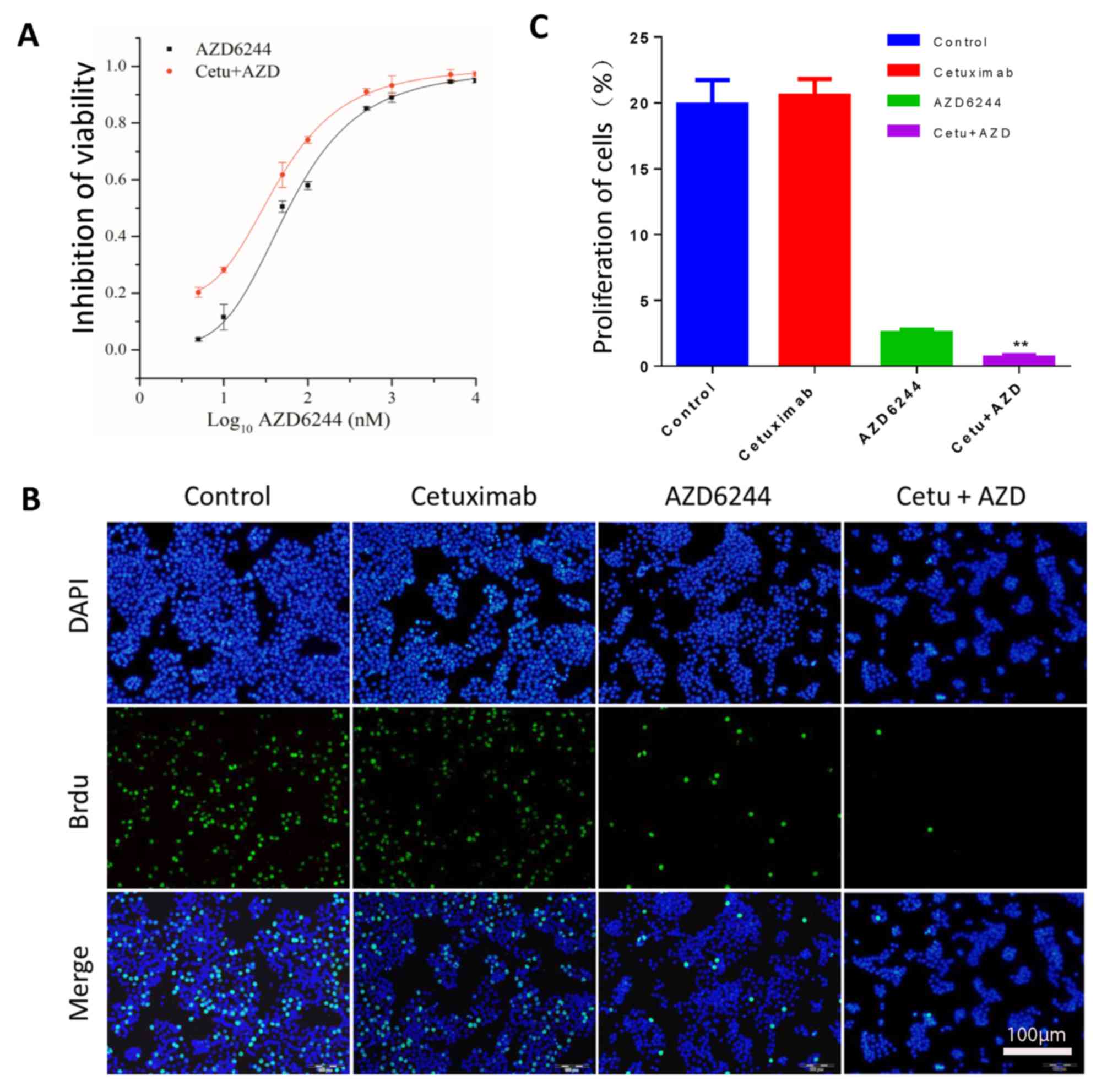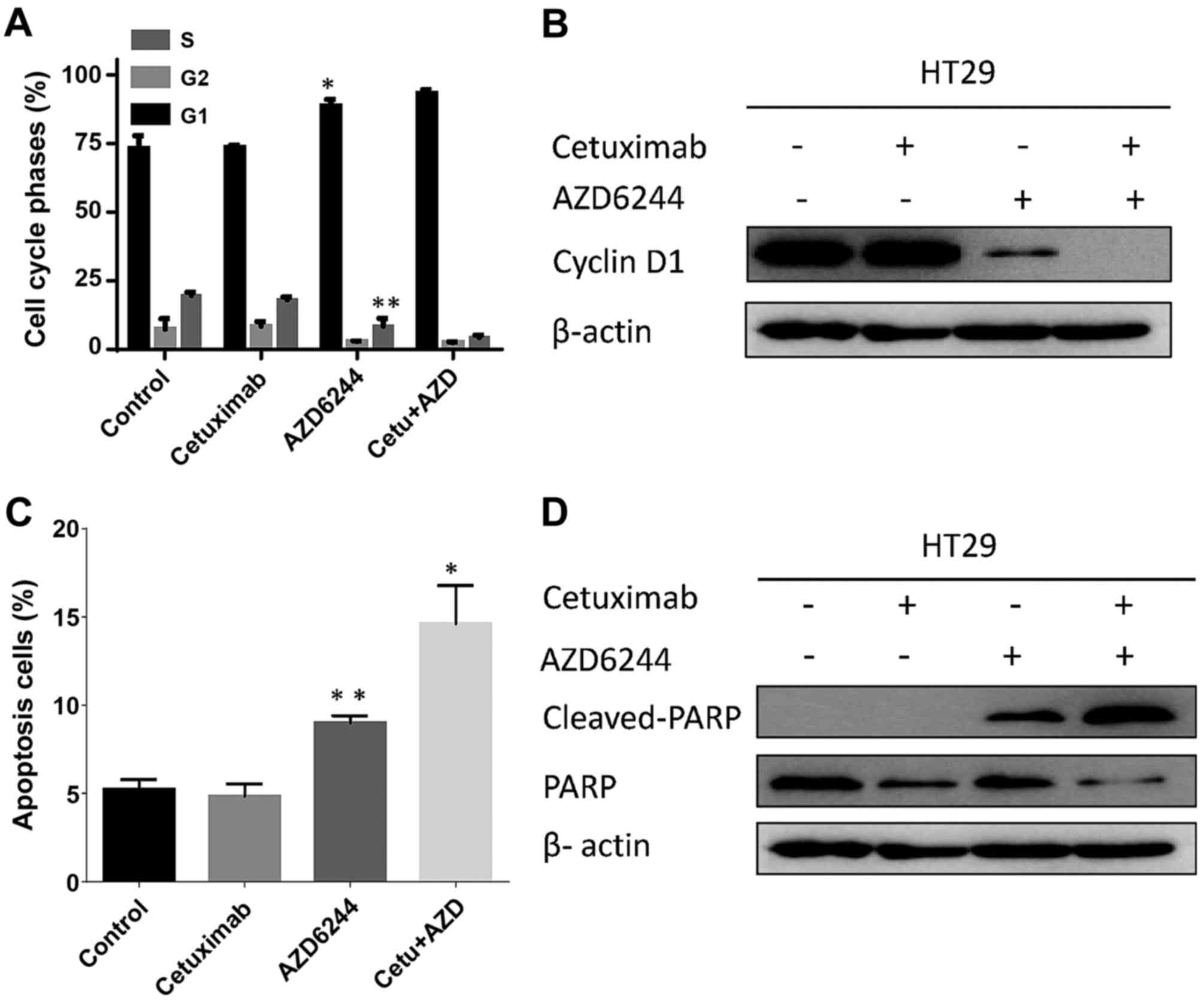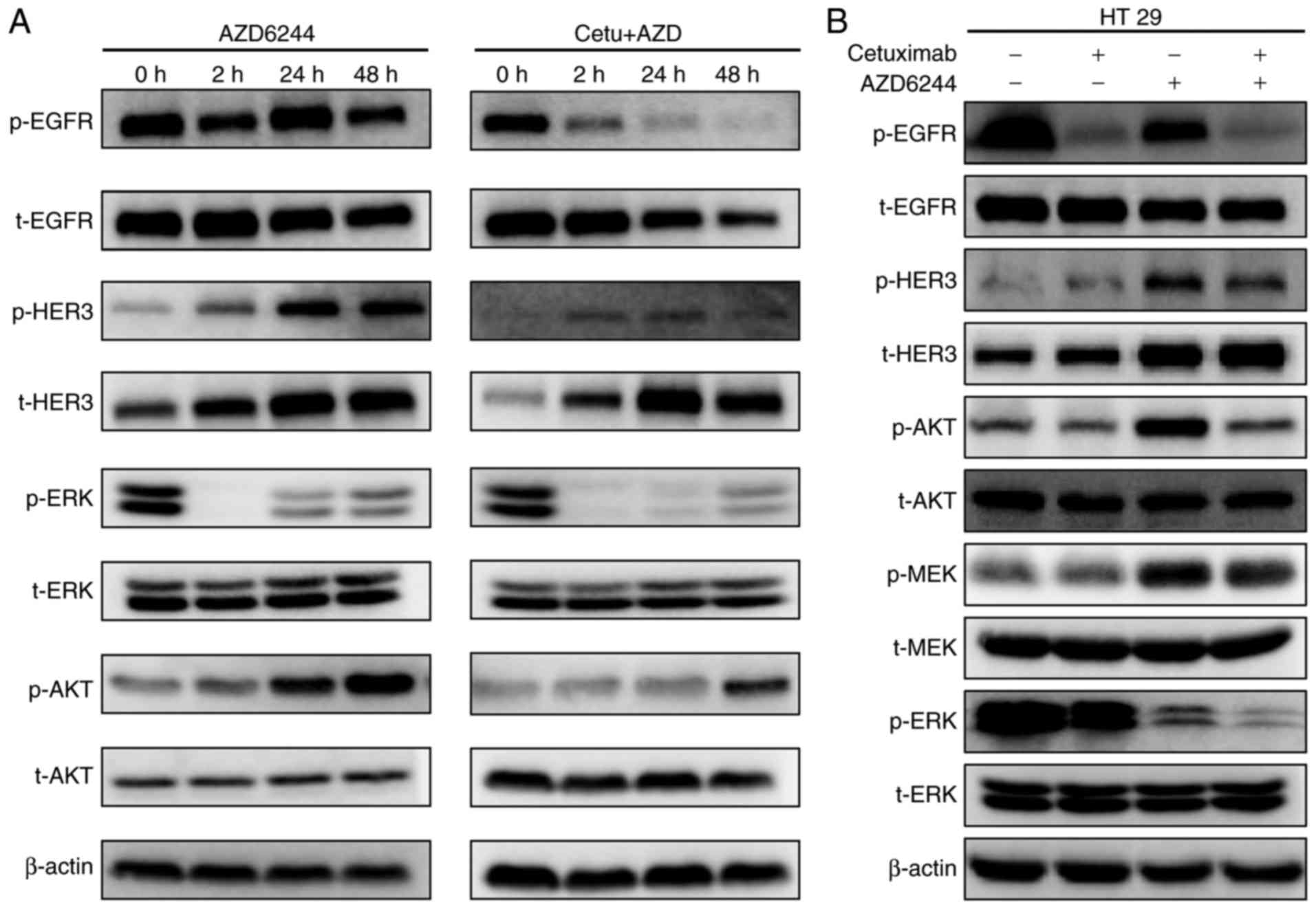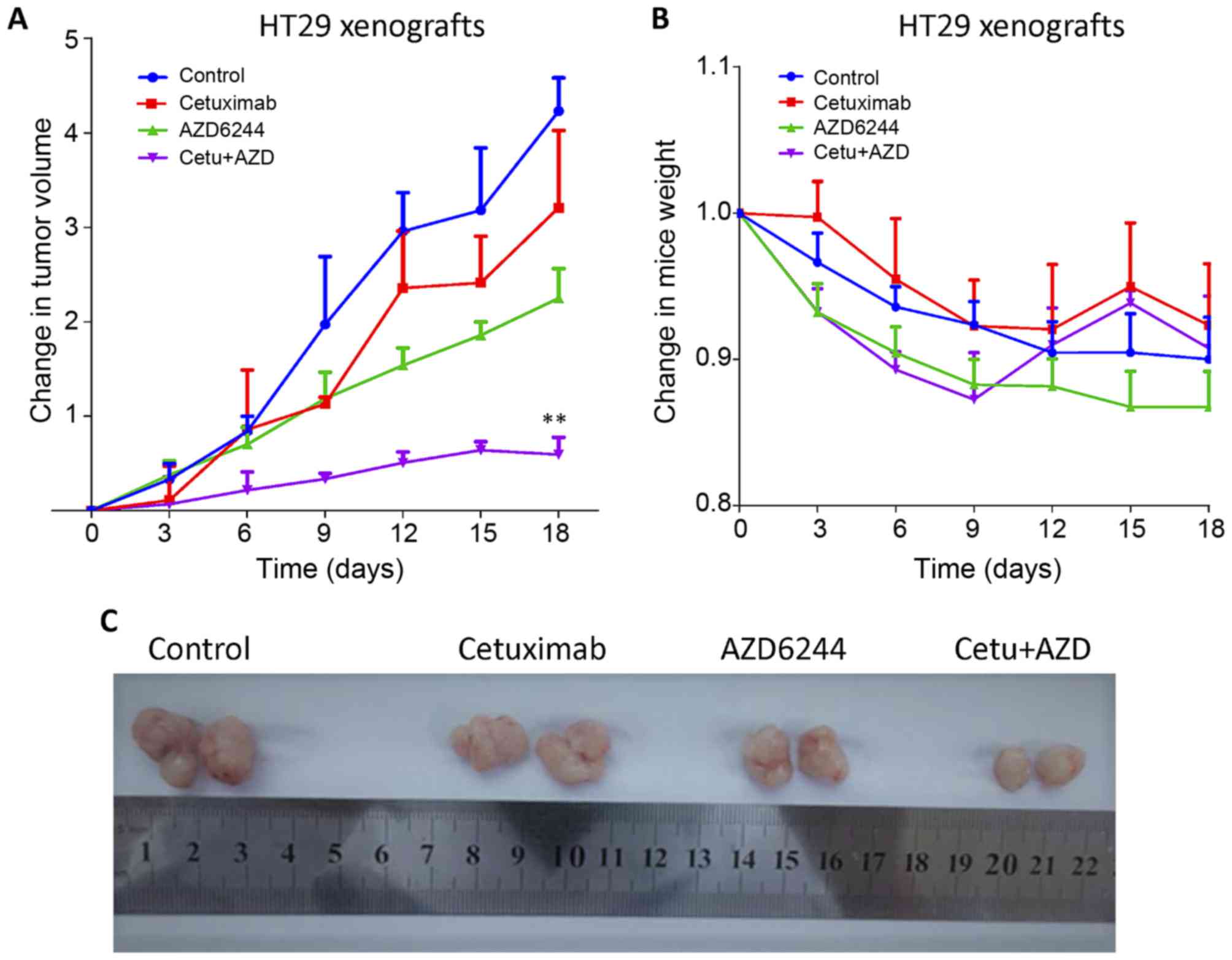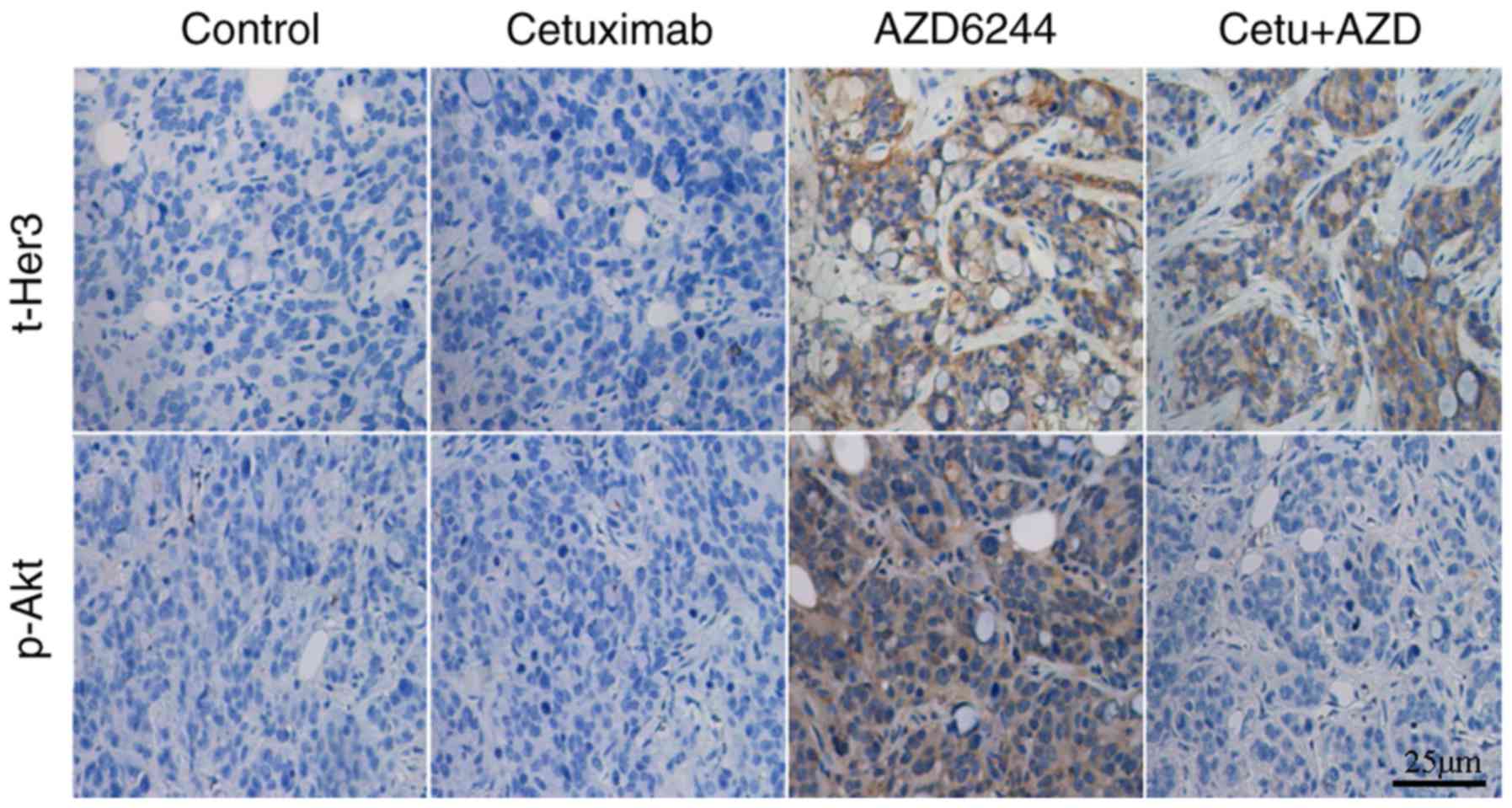|
1
|
Torre LA, Bray F, Siegel RL, Ferlay J,
Lortet-Tieulent J and Jemal A: Global cancer statistics, 2012. CA
Cancer J Clin. 65:87–108. 2015. View Article : Google Scholar : PubMed/NCBI
|
|
2
|
Arnold M, Sierra MS, Laversanne M,
Soerjomataram I, Jemal A and Bray F: Global patterns and trends in
colorectal cancer incidence and mortality. GUT. 66:683–691. 2017.
View Article : Google Scholar : PubMed/NCBI
|
|
3
|
US Preventive Services Task Force, .
Bibbins-Domingo K, Grossman DC, Curry SJ, Davidson KW, Epling JW
Jr, García FAR, Gillman MW, Harper DM, Kemper AR, et al: Screening
for colorectal cancer: US preventive services task force
recommendation statement. JAMA. 315:2564–2575. 2016. View Article : Google Scholar : PubMed/NCBI
|
|
4
|
Siegel RL, Miller KD, Fedewa SA, Ahnen DJ,
Meester RGS, Barzi A and Jemal A: Colorectal cancer statistics,
2017. CA Cancer J Clin. 67:1772017. View Article : Google Scholar : PubMed/NCBI
|
|
5
|
McGuire S: World cancer report 2014.
Geneva, Switzerland: World Health Organization, International
agency for research on cancer, WHO Press, 2015. Adv Nutr.
7:418–419. 2016. View Article : Google Scholar : PubMed/NCBI
|
|
6
|
Guinney J, Dienstmann R, Wang X, de
Reyniès A, Schlicker A, Soneson C, Marisa L, Roepman P, Nyamundanda
G, Angelino P, et al: The consensus molecular subtypes of
colorectal cancer. Nat Med. 21:1350–1356. 2015. View Article : Google Scholar : PubMed/NCBI
|
|
7
|
Carethers JM and Jung BH: Genetics and
genetic biomarkers in sporadic colorectal cancer. Gastroenterology.
149:1177–1190.e3. 2015. View Article : Google Scholar : PubMed/NCBI
|
|
8
|
Richman SD, Seymour MT, Chambers P,
Elliott F, Daly CL, Meade AM, Taylor G, Barrett JH and Quirke P:
KRAS and BRAF mutations in advanced colorectal cancer are
associated with poor prognosis but do not preclude benefit from
oxaliplatin or irinotecan: Results from the MRC FOCUS trial. J Clin
Oncol. 27:5931–5937. 2009. View Article : Google Scholar : PubMed/NCBI
|
|
9
|
Di Nicolantonio F, Martini M, Molinari F,
Sartore-Bianchi A, Arena S, Saletti P, De Dosso S, Mazzucchelli L,
Frattini M, Siena S and Bardelli A: Wild-type BRAF is required for
response to panitumumab or cetuximab in metastatic colorectal
cancer. J Clin Oncol. 26:5705–5712. 2008. View Article : Google Scholar : PubMed/NCBI
|
|
10
|
Infante JR, Fecher LA, Falchook GS,
Nallapareddy S, Gordon MS, Becerra C, DeMarini DJ, Cox DS, Xu Y,
Morris SR, et al: Safety, pharmacokinetic, pharmacodynamic, and
efficacy data for the oral MEK inhibitor trametinib: A phase 1
dose-escalation trial. Lancet Oncol. 13:773–781. 2012. View Article : Google Scholar : PubMed/NCBI
|
|
11
|
Lin L, Asthana S, Chan E, Bandyopadhyay S,
Martins MM, Olivas V, Yan JJ, Pham L, Wang MM, Bollag G, et al:
Mapping the molecular determinants of BRAF oncogene dependence in
human lung cancer. Proc Natl Acad Sci USA. 111:E748–E757. 2014.
View Article : Google Scholar : PubMed/NCBI
|
|
12
|
Mirzoeva OK, Das D, Heiser LM,
Bhattacharya S, Siwak D, Gendelman R, Bayani N, Wang NJ, Neve RM,
Guan Y, et al: Basal subtype and MAPK/ERK kinase
(MEK)-phosphoinositide 3-kinase feedback signaling determine
susceptibility of breast cancer cells to MEK inhibition. Cancer
Res. 69:565–572. 2009. View Article : Google Scholar : PubMed/NCBI
|
|
13
|
Chou TC: Drug combination studies and
their synergy quantification using the Chou-Talalay method. Cancer
Res. 70:440–446. 2010. View Article : Google Scholar : PubMed/NCBI
|
|
14
|
Rubinfeld H and Seger R: The ERK cascade:
A prototype of MAPK signaling. Mol Biotechnol. 31:151–174. 2005.
View Article : Google Scholar : PubMed/NCBI
|
|
15
|
Misale S, Arena S, Lamba S, Siravegna G,
Lallo A, Hobor S, Russo M, Buscarino M, Lazzari L, Sartore-Bianchi
A, et al: Blockade of EGFR and MEK intercepts heterogeneous
mechanisms of acquired resistance to anti-EGFR therapies in
colorectal cancer. Sci Transl Med. 6:224ra262014. View Article : Google Scholar : PubMed/NCBI
|
|
16
|
Friday BB, Yu C, Dy GK, Smith PD, Wang L,
Thibodeau SN and Adjei AA: BRAF V600E disrupts AZD6244-induced
abrogation of negative feedback pathways between extracellular
signal-regulated kinase and Raf proteins. Cancer Res. 68:6145–6153.
2008. View Article : Google Scholar : PubMed/NCBI
|
|
17
|
Prahallad A, Sun C, Huang S, Di
Nicolantonio F, Salazar R, Zecchin D, Beijersbergen RL, Bardelli A
and Bernards R: Unresponsiveness of colon cancer to BRAF(V600E)
inhibition through feedback activation of EGFR. Nature.
483:100–103. 2012. View Article : Google Scholar : PubMed/NCBI
|
|
18
|
Yoon YK, Kim HP, Han SW, Hur HS, Oh DY, Im
SA, Bang YJ and Kim TY: Combination of EGFR and MEK1/2 inhibitor
shows synergistic effects by suppressing EGFR/HER3-dependent AKT
activation in human gastric cancer cells. Mol Cancer Ther.
8:2526–2536. 2009. View Article : Google Scholar : PubMed/NCBI
|
|
19
|
Okimoto RA, Lin L, Olivas V, Chan E,
Markegard E, Rymar A, Neel D, Chen X, Hemmati G, Bollag G and
Bivona TG: Preclinical efficacy of a RAF inhibitor that evades
paradoxical MAPK pathway activation in protein kinase BRAF-mutant
lung cancer. Proc Natl Acad Sci USA. 113:13456–13461. 2016.
View Article : Google Scholar : PubMed/NCBI
|
|
20
|
Littlefield P, Liu L, Mysore V, Shan Y,
Shaw DE and Jura N: Structural analysis of the EGFR/HER3
heterodimer reveals the molecular basis for activating HER3
mutations. Sci Signal. 7:a1142014. View Article : Google Scholar
|
|
21
|
Mizukami T, Togashi Y, Sogabe S, Banno E,
Terashima M, De Velasco MA, Sakai K, Fujita Y, Tomida S, Nakajima
TE, et al: EGFR and HER2 signals play a salvage role in
MEK1-mutated gastric cancer after MEK inhibition. Int J Oncol.
47:499–505. 2015. View Article : Google Scholar : PubMed/NCBI
|
|
22
|
Chandarlapaty S, Sawai A, Scaltriti M,
Rodrik-Outmezguine V, Grbovic-Huezo O, Serra V, Majumder PK,
Baselga J and Rosen N: AKT inhibition relieves feedback suppression
of receptor tyrosine kinase expression and activity. Cancer Cell.
19:58–71. 2011. View Article : Google Scholar : PubMed/NCBI
|
|
23
|
Xing EJJ, Gong H, He J and Zhang W:
Combine MEK inhibition with PI3K/mTOR inhibition exert inhibitory
tumor growth effect on KRAS and PIK3CA mutation CRC xenografts due
to reduced expression of VEGF and matrix metallopeptidase-9. Tumour
Biol. 36:1091–1097. 2015. View Article : Google Scholar : PubMed/NCBI
|
|
24
|
Haagensen EJ, Kyle S, Beale GS, Maxwell RJ
and Newell DR: The synergistic interaction of MEK and PI3K
inhibitors is modulated by mTOR inhibition. Br J Cancer.
106:1386–1394. 2012. View Article : Google Scholar : PubMed/NCBI
|















